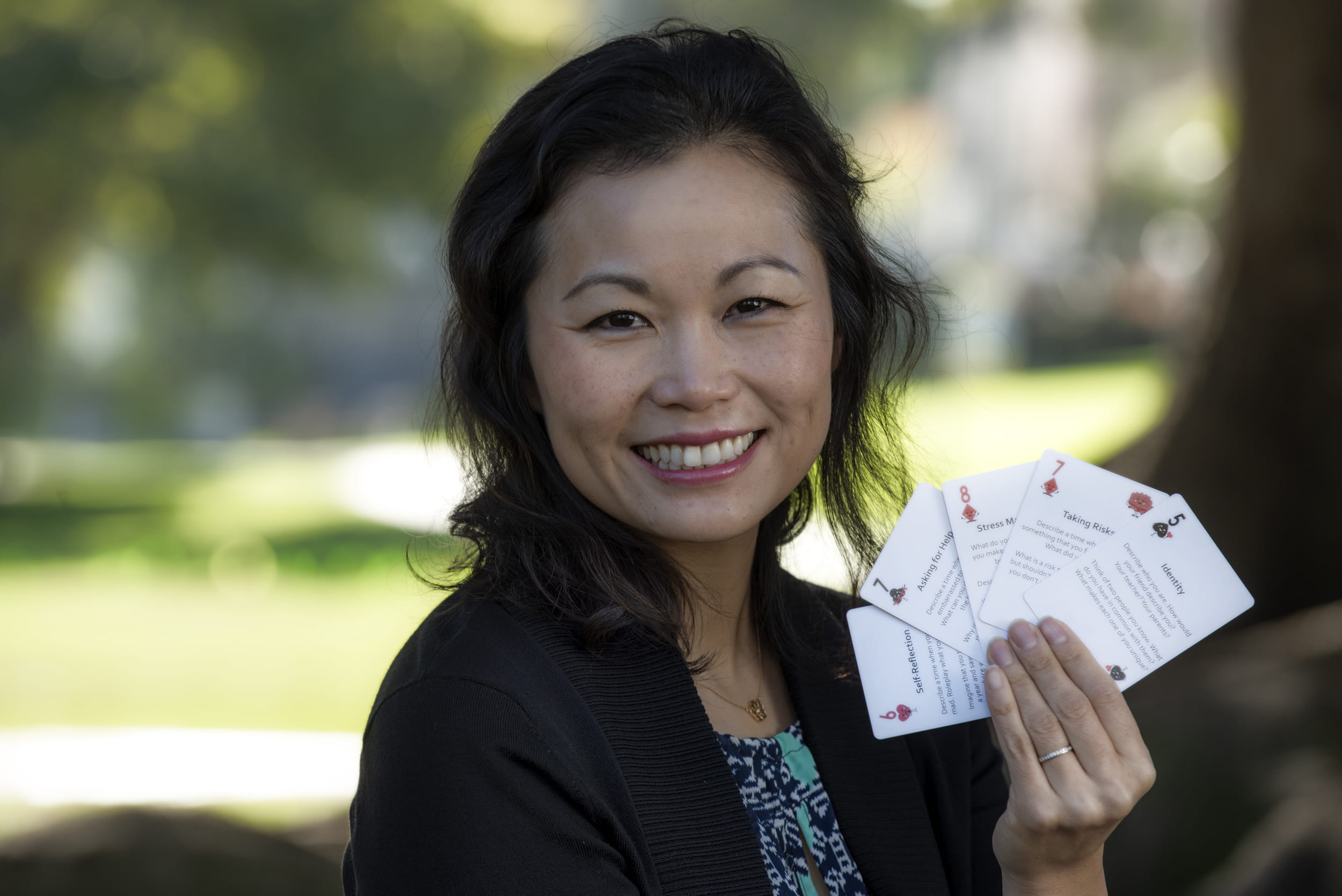Better parenting is in the cards
UCI startup incubator helps doctoral student market innovative game promoting life skills

Parents have good intentions. They know they should be making the most of “teaching moments,” fostering social-emotional skills that will help their children become resilient, healthy and successful adults – important skills rarely taught at school. But mothers and fathers are often too busy with jobs, chores and the everyday routine of running a family. An Anteater, however, may have a solution.
52 Essential Conversations is a learning game created to help parents prepare their kids for life as well as connect with them on a deeper level. It’s essentially a deck of cards, with each dedicated to a specific characteristic, such as patience or mindfulness. Every card contains two questions meant to drive conversation between an adult and a child about self-awareness, self-management, social awareness, relationships, responsible decision-making, or diversity and inclusion.

Created by Jenny Woo, a UCI doctoral student in education and mother of three, the game is quite simple. “But the magic lies in the simplicity itself,” she says.
Woo’s company, Mind Brain Parenting – which is behind 52 Essential Conversations – is part of UCI Applied Innovation’s highly selective Wayfinder Incubator. The program helps campus-affiliated startups become successful by providing management teams with space, strategic guidance and other valuable support services.
For example, it sponsors a pitch-and-match event that exposes new participants to potential mentors, other startups and the Applied Innovation community, with the goal of finding resources that their businesses lack. Woo appeared at such a function in October to seek assistance in getting her product directly to the consumer, as 52 Essential Conversations is currently being sold primarily through schools.
Identifying the need
Before earning an MBA at UC Berkeley and a master’s degree in mind, brain & education at Harvard University, Woo worked as a human capital consultant at Deloitte Consulting, where she coached company executives to fulfill their potential.
“It was really in working with adults that I started to see some themes around barriers that were preventing people from getting to the next level or understanding what they were passionate about,” Woo says. “That’s when I began to think, ‘What is it about their upbringing that influenced how they are today? And is there a way to intervene during those childhood periods that would save them the agony and frustration they’re experiencing as adults?’”
Common issues she noticed included the fear of failure, the inability to delegate or work collaboratively with others, and anxiety from taking on too much responsibility. Woo thought these problems might stem from the approach of most K-12 schools, with their focus on individual achievement and students’ GPAs.
“What could parents do to advance their children’s social and emotional development?” she wondered. “How could they better ensure their success and well-being as adults?”
It was around this time that Woo became a parent herself and helped found one of Irvine’s first Mandarin Montessori preschools, both of which gave her more insight into the correlation between upbringing and adult shortcomings – and into the travails of raising children.
“One source of anxiety for parents is that there’s just way too much advice out there,” she says. “People are telling you what to do left and right, and then you’re reading thousands of articles and opinions about this stuff. So how can you really understand what’s important in a way that empowers you?”
Education and innovation
This series of events inspired Woo to go back to school to gain a more evidence-based understanding of how brain and cognitive development is shaped by learning experiences and environment.
At Harvard, she was admitted to the Venture Incubation Program – established to help students and alumni pursue entrepreneurial interests – which is where she eventually came up with the idea for the cards.
They include such subjects as kindness, doing the right thing, generosity, self-confidence, goal setting and citizenship and are designed to broaden critical thinking skills, encourage empathy and responsibility, develop self-awareness, reduce social anxiety, and build vocabulary and academic language.
52 Essential Conversations won a 2018 Parents’ Choice “recommended” seal and is cited as a social and emotional learning resource by the California Department of Education. It’s currently used in more than 40 states and 20 countries by parents, caregivers, teachers, psychologists and pediatricians, according to Woo.
“I use the deck myself with my children, especially after I’ve had a busy day or am feeling overwhelmed at home,” she says. “I continue to be amazed by the number of teachable moments ignited out of our conversations. It has helped me feel more connected to my children and happier that I’ve done my part right.”


